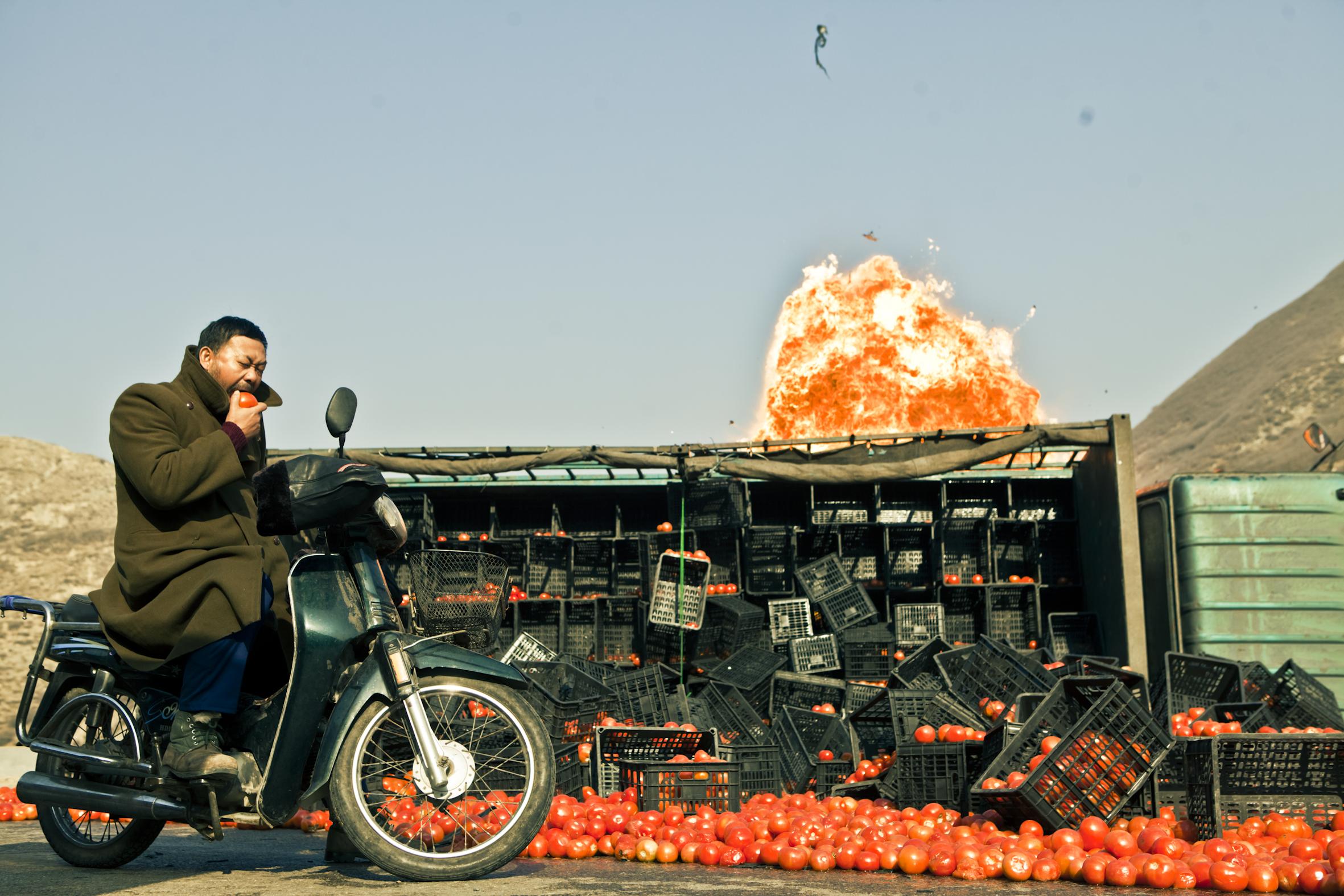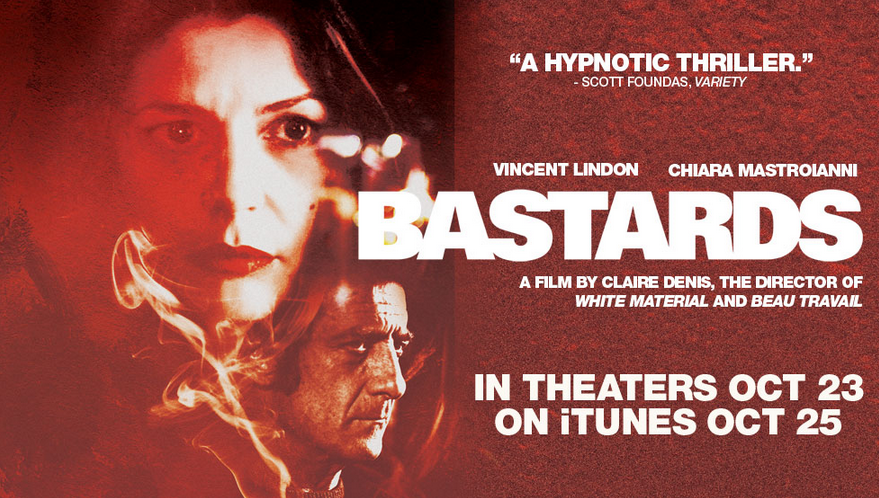A Touch of Sin (Jia Zhangke, China, 2013)
There is a fun dynamic in the arthouse world in Denmark. A film premieres at Cannes, gets rave reviewes, wins an award. Then it takes 11 months for it to hit CPHPIX. A very long time to prepare, read reviews, analyses, watch the director's earlier filmography (though I failed to do so with Jia). Get hyped. In the end, it might be hard for the film to really hit you, and exceed your expectations. Stray Dogs managed to do so. A Touch of Sin is quite clearly the second-best film I've seen this year, but it didn't really rise above my expectations.
Four stories with violent conclusions, taken from contemporary China. Slightly intertwined. All taken from real news-stories, though they were mainly big on China's microblogging site Weibo, the unofficial way to get news. Using genretrappings to create a picture of a deceased society. In many ways, this is the perfect version of what Manuscript's Don't Burn tried to do. The cinematography is stunning, with the mobile but steady camera constantly catching amazing picture after amazing picture. It's never boring. And the film feels open, as if it has more on it's mind than just the four tragic stories it tells.
Actually, what most fascinates me right now is the insane amount of stories being told or alluded to in this film. There are Weibo-stories of corruption being discussed. There is a trainwreck catastrophy occuring all of a sudden. Tv-screens show apropiate movies - John Woo and Tsui Hark, apparantly, famous Hong Kong action directors. The characters watch snippets of Chinese Opera, based on the old Chinese novel The Water Margin, about noble characters forced into being violent outlaws. The English name of the film is an allusion to the old wuxia film A Touch of Zen, a masterpiece in it's own right. The scenography of the film manages to tell a bunch of stories as well: An oppulent car in a desolate village tells a story of inequality and corruption, grand hills of coal tells of ecological disruption.
It all adds up to a compendium of modern myths. This is a brilliant way to counter censorship: An explosion of counter-stories, showing not just a multitude of unofficial stories, but also the inability to keep those stories hidden. An overwhelming portrait of a dysfunctional country, this film should be seen by everyone interested in the world as it is today. The shut-down coal-mines, the migrant-workers, the saunas, the high-speed trains, the unsafe sweatshops creating goods for export. This film does to China what The Great Beauty did to Italy, though many times more effectively - and I liked The Great Beauty. It's a film filled with great scenes and details, like a character using three cigarettes to pray to the ghosts of the people he's killed, or a line of girls marching in a display of Red Army kitch for Cantonese visitors. The fact that it was ever slated for a mainland Chinese release is amazing, though the regime has delayed it infinitely. But it will hopefully be downloaded illegally, and discussed on Weibo. It is a great film, and very important. But I knew that, most of the people reading this probably also already knows this. And it's not more than that, I think.
Bastards (Claire Denis, France, 2013)
I've seen this film before, on a VOD-stream. But boy did I miss a lot. One has to be careful with a Denis-film, I missed a neon-sign, and thereby a huge chunk of the plot. A woman walks toward a Tabac-sign, then it shuts down, signalling that the shop has closed. The man living in the appartment above grabs some packs of cigarettes, wraps them in his shirt, and throws them down on the street. That shirt becomes the facillitator of their flirt, and without understanding why he threw it down, it all just seemed very weird.
I like the way details add up in this kind of Denis. Shots of stuff, of faces, of bodies. And then we have to piece their meaning together. 35 Shots of Rhum did it with a story of a makeshift family of immigrants, whose relations only gradually came clear to the audience. Bastards does the same thing with a Lynchian mystery. Which does make it less interesting to me. A mystery-like style is more innovative for a family drama than for a mystery. Also, the pictures are slightly murky, and the dream-like interludes make the plot hard to follow: After the suicide of his brother-in-law and the hospitalization of his niece, Marco returns home and moves into the flat above the man he decides is responsible: The wealthy banker Laporte. Marco begins an affair with Laporte's young wife, which is depicted tenderly. But the investigation into Laporte remain unfulfilling.
A thing I noted: The title of the film is in plural (Les Salauds in French instead of Le Salaud. The true English translation would be The Bastards) So when Marco claims on Laporte: It is He who is the Bastard. He is wrong. At other times he seems to recognize this, he claims to have been happy he's divorced, so that his daughters won't be 'infected' by what was wrong with his sisters family. Notably, that infection would have to run through himself. I've seen commenters talking about this as a film attacking the wealthy privilege of Laporte, but I don't see it. I see it more as a feminist tale. A short clip of a naked woman lying on the street in Paris seems to bear this out. In this way, Marco becomes one of the Bastards as well: He continues to want to dominate in his affair and tells her what to think and do, and never listens to what she says. He is using her to get at Laporte, and Laporte is actually quite right when he takes his young son away from the influence of a man he decides is dangerous. In the end, people will die, tough secrets will come to the surface, and a woman will make a choice and take action. And the young son will probably be traumatized.
I think Denis belongs in any discussion of the best directors working today. Beau Travail is a massive masterpiece. Friday Night is slight, but creates a fantastic world for it's characters. 35 Shots of Rhum and White Material are great as well. This one is lesser. The filmmaking is exquisite, though murky and hard to grasp. But the themes don't really add up, I don't think. It becomes slightly facile.
Real (Kiyoshi Kurosawa, Japan, 2013)
Kiyoshi Kurosawa is really productive these years. Last year I saw his Penance at PIX, a 2012 tv-series turned into 4-hour film. And after Real, he managed to get yet another film into theaters in 2013, which we might get to see in 2015? And this is coming after him not having made a feature since Tokyo Sonata in 2008. I kinda liked Penance, though it had it's flaws. It was uneven visually and overlong and -plotted, but I just decided that was probably due to it being a tv-series, and focused on the highpoints and it's thematic richness. But Real is a feature film, and it has all the same problems. Apparantly, this might be a new 'style', and if so, them I'm probably not going to prioritize catching the next thing he does.
Kiyoshi Kurosawa got famous for doing J-horror to begin with, and though this isn't a horror-film, his chops are in great use. The plot revolves around a machine allowing people to do something called 'Sensing', entering the mind of a comatose patient, and trying to convince them to wake up. The young man Koichi is trying to wake up his girlfriend Atsumi, a manga-artist who tried to commit suicide. The brilliant twist is that the stress from use of the machine causes people to hallucinate, even when they are out of it. So you have an Inception-like dream-world, where everything can happen. And then you have the real world, except it's full of hallucinations. So everything can happen. There's some great stuff with this, scenes looking like they are drawn, off-kilter photography, and tropes taken from the horror-playbook. Except that it quite explicitly is just all in the head, and everyone knows this. But then the twists starts coming, and boy... I don't want to ruin the experience but I feel like I need to say this: People in the theater was howling with laughter at the stupid twists, and then groaning once another twist meant the film had more story to tell.
That was insane. I don't know what on earth Kurosawa was thinking, but there are things in this film which is quite clearly the dumbest, ugliest, most ridiculous stuff I've seen at this festival. It might not be Kurosawa's fault, the film is based on a book called A Perfect Day for Plesiosaur, so the dumb plot might be a consequence of adapting the book too faithfully. That the visual side is so unapealing, that is on Kurosawa, though. It might be a question of taste, but I strongly dislike the aesthetic of his last few films. Tokyo Sonata is amazing - and the only earlier of his I've seen - so I don't get why this looks like it does. But it's way too digital and sleek, with modern appartments in steel and glass looking way too impersonal, and the colours being way too cold. And the music is just horrible, all the way through.
This is baffling. Half a fun but flawed psychological horror/sci-fi-hybrid, and half completely ridiculous... yeah, I don't know how to describe the second half. It's awful, though. Catch it for the visual trickery in the first half, but be prepared for a massive let-down.




Ingen kommentarer:
Send en kommentar